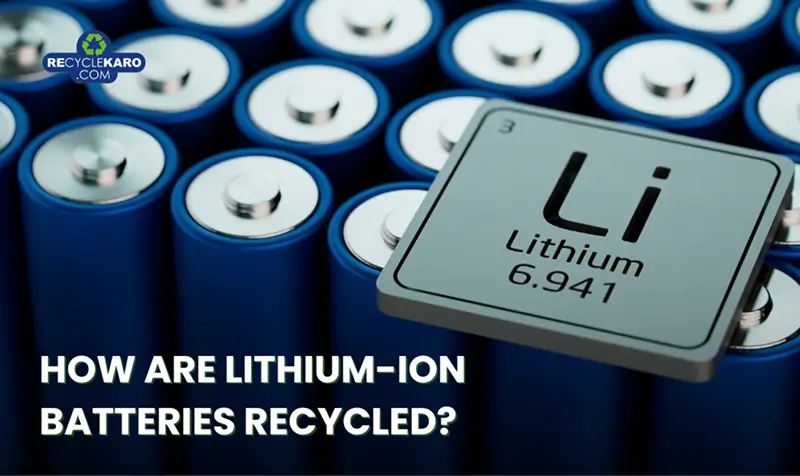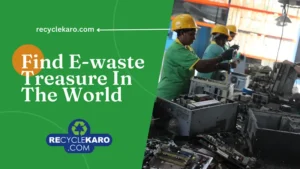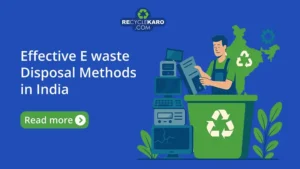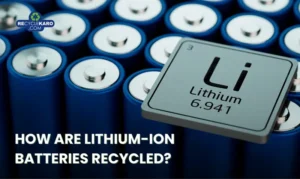EV Battery Recycling in India [2025]

India is on the verge of an EV revolution, but battery waste management is lagging behind. By 2030, India could generate over 50,000 tonnes of end-of-life EV batteries annually. Without recycling infrastructure, this waste becomes both an environmental hazard and a missed economic opportunity.
Recyclekaro is bridging this gap with scalable hydrometallurgy-based solutions that recover up to 95% of high-value metals while reducing carbon emissions, creating a closed-loop supply chain for India’s EV future.
What happens to EV batteries at the end of their useful life in a vehicle?
1. First Life Ends (in the Vehicle)
- EV batteries are considered to have reached “end of life” in a vehicle when their capacity drops to about 70–80% of the original.
- At this stage, they can no longer provide the range and performance needed for mobility, but they still retain substantial energy storage potential.
2. Second-Life Applications (Reuse)
Before being recycled, many batteries go into repurposed energy storage systems:
- Stationary storage for renewable energy (solar/wind farms).
- Backup power for commercial buildings or telecom towers.
- Grid balancing to stabilize electricity demand and supply.
This stage can extend the battery’s utility for another 5–10 years.
3. Recycling (Material Recovery)
When batteries can no longer be reused, they enter the recycling stage:
- Disassembly – Battery packs are dismantled into modules and cells.
- Material extraction – Valuable metals (lithium, cobalt, nickel, manganese, copper, aluminum) are recovered.
- Pyrometallurgy: High-temperature smelting; quicker but less efficient and more polluting.
- Hydrometallurgy: Chemical leaching; more precise, scalable, and sustainable, with recovery rates up to 95%.
- Pyrometallurgy: High-temperature smelting; quicker but less efficient and more polluting.
- Closed-loop reuse – Extracted materials are reintroduced into new EV battery production, reducing the need for mining.
4. Environmental & Compliance Safeguards
Proper recycling prevents:
- Loss of critical minerals to unsafe or illegal channels.
- Toxic leaching into soil/water.
- Fire and safety hazards from informal handling.
Why Recycle EV Batteries?
As India accelerates towards its 2030 EV adoption goals, the flip side of the story is emerging: battery waste. Lithium-ion EV batteries, once exhausted, pose two critical risks:
- Environmental impact – Toxic metals like cobalt, nickel, and manganese can leach into soil and water if improperly discarded.
- Resource dependence – India currently imports most of its critical minerals. Recycling offers a way to recover up to 95% of valuable metals, reducing reliance on volatile international supply chains.
Recycling EV batteries is not just waste management—it’s a strategic imperative for energy security, ESG compliance, and circular economy leadership.
Gaps in India’s EV Battery Recycling Capacity and Processes
Despite the opportunity, challenges remain:
- Capacity Shortfall: Current recycling infrastructure can handle less than 10% of expected 2030 waste volumes.
- Technology Gaps: Many recyclers rely on pyrometallurgy, which is energy-intensive and less efficient in recovering metals.
- Fragmented Supply Chains: Collection and reverse logistics remain underdeveloped, leading to leakage into informal or unsafe recycling channels.
- Standardization Issues: Lack of unified processes means inconsistent recovery rates and compliance risks for OEMs.
Unless addressed, these gaps could undermine both India’s EV growth and its sustainability targets.
Recent Developments & Opportunities Ahead for India
India’s EV transition is moving fast:
- EV sales are projected to reach 10 million units annually by 2030.
- This translates to over 50,000 tonnes of spent batteries each year.
Globally, hydrometallurgy—the process of extracting high-purity metals through chemical leaching—is emerging as the gold standard for sustainable recycling.
As Recyclekaro puts it:
“The future of EV battery recycling isn’t just about recovery, it’s about precision, scalability, and sustainability. Hydrometallurgy is emerging as the linchpin of this shift… By 2030, nearly half of all EV battery recycling could be powered by this process. The challenge now? Scaling infrastructure, standardizing methods, and building stronger reverse supply chains.”
This presents a multi-billion-dollar opportunity for India to become self-reliant in battery material recovery while setting global benchmarks in sustainability.
How Recyclekaro Solves This?
Recyclekaro is building the next-generation EV battery recycling ecosystem in India by focusing on technology, scalability, and compliance:
- Hydrometallurgy-first approach
- Recovers 90–95% of lithium, nickel, and cobalt.
- Uses less energy and produces fewer emissions than pyrometallurgy.
- Enables closed-loop recycling—turning yesterday’s battery into tomorrow’s resource.
- Scalable Modular Plants
- Facilities designed for rapid expansion to match India’s EV growth.
- Ensures OEMs have a reliable partner as battery waste volumes surge.
- Reverse Logistics Partnerships
- Works with OEMs, fleets, and distributors to streamline collection systems.
- Ensures compliance with EPR regulations while reducing leakage into informal sectors.
- Sustainability and ESG Alignment
- Provides OEMs and investors with transparent reporting.
- Helps reduce import dependency and carbon footprint simultaneously.
Recyclekaro is not just solving today’s recycling problem—it is building the infrastructure India needs for a circular EV economy.EV battery recycling in India is no longer optional — it’s a necessity. With government mandates, rising EV adoption, and global best practices converging, the opportunity is massive.
Recyclekaro is leading this transition with sustainable, hydrometallurgy-based recycling solutions that align with both environmental goals and business objectives.





You can find all the useful information you need on the Vavada mirror. Find out why players switch to the official Vavada website via the mirror, and discover the benefits: similar registration and login processes, bonuses, promo codes